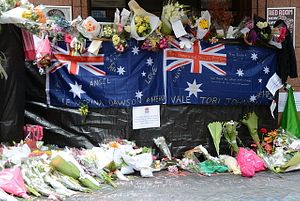In June, the Lowy Institute released the results from its annual poll of Australians and their views on a host of foreign policy issues. The poll showed a country more fearful in general – and of terrorism in particular – and cognizant but only marginally worried about events in the South China Sea.
On Terrorism
One of the most startling findings was that only 24 percent of Australians reported that they felt “very safe” in their country. The figure is the lowest since polling began a decade ago, with those who reported feeling “safe” dropping by 12 percentage points since 2010.
Of the biggest concern for Australians were terrorism threats. As Lowy Institute director Michael Fullilove and the poll’s architect Alex Oliver noted: “Terrorism-related risks rank first, second and third in Australians’ threat perceptions.” It is unsurprising then that most Australians polled (69%) supported Canberra’s military involvement in Iraq to combat ISIS, with an equal number seeing ISIS as a high risk to Australia’s security.
Diminished perceptions of safety in Australia are no doubt impacted by the Lindt café siege in late 2014. But they are also a reflection of the recently embattled prime minister refocusing the politics of the day around security – a move that has proved beneficial to his own ratings.
Yet still, that Australians feel increasingly insecure about terror threats is surprising. Australia’s intelligence and law enforcement has repeatedly shown that it is capable of dealing with threats across the country and on matters of operational and intelligence cooperation abroad. As experts on the issue frequently note, while Australia has work to do on the softer side of countering violent extremism, Australia has the hard side of counter-terrorism right. Indeed, the recent hardening of terror laws, including the stripping of citizenship from dual citizens, shows the government’s willingness to ride this train to the last stop. Similarly, recent commitments following the Summit on Countering Violent Extremism go part of the way to addressing previous resistance to improving the softer side of counter-terrorism. Those sentiments were supported in the Poll where nearly six out of ten people believed the government had responded well to the threat of terrorism.
On China & the South China Sea
Domestic debate on terrorism in Australian media takes up a disproportionate chunk of talk on foreign policy. Whereas debate about relations with China – which go to the heart of Australia’s place in the Asian century – win far less airtime.
It would be reasonable to think that recent tensions in the South China Sea would merit considerable concern – the majority of Australia’s trade passes through the Sea. Similarly, recent “plain speaking” by the government on China’s actions in the South China Sea has received domestic media attention this year. Yet compared to terrorism, few of those polled were worried and in some cases concern had diminished.
In what was the lowest response in more than five years, only 39 percent believed that in the next 20 years Beijing would become a military threat to Australia. Similarly, on a list of eight possible threats, the two relating to maritime disputes with China ranked amongst the lowest. This likely reflects improved perceptions of China after much talk on the signing of a free trade agreement with Beijing (formally signed in June), an assumption that is supported by 77 percent agreeing that Beijing is an economic partner. Though, for China-Australia relations, it’s not a free ride. Positive relations, respondents suggested, should not be unconditional, with 66 percent agreeing that “Australia should do more to resist China’s military aggression in our region, even if this affects our economic relationship.” More specifically, one could conclude that such resistance would come from military aggression closer to Australia. Some 84 percent of those polled said that Canberra should remain neutral in the event of conflict between Japan and China. Of those that wanted intervention, 11 percent thought Canberra should support Japan and only 3 percent said it should support China.
In a worrying sign for the stability of that economic relationship respondents demonstrated how favorable perceptions could deteriorate due to provincial concerns. There was strong concern about China’s investment in Australia’s residential real estate market, with 70 percent saying that government allows too much investment from China in the housing market. That reflects current debates of a bubble in the housing market, with analysts warning that markets in Sydney and Melbourne are overheating.
The Lowy Poll shows an Australia that is inward looking and comfortable with a status quo that doesn’t rock the economy. It shows an Australia that is reluctant to enter larger regional disputes, albeit comfortable coercing on the sidelines or joining European and North American allies further afield. Australian governments have long been led by polls. The Lowy poll is a good indication of Australia’s foreign policy to come. It would indicate that we can expect tough talk and action on terrorism and a more measured response on China and the South China Sea.

































